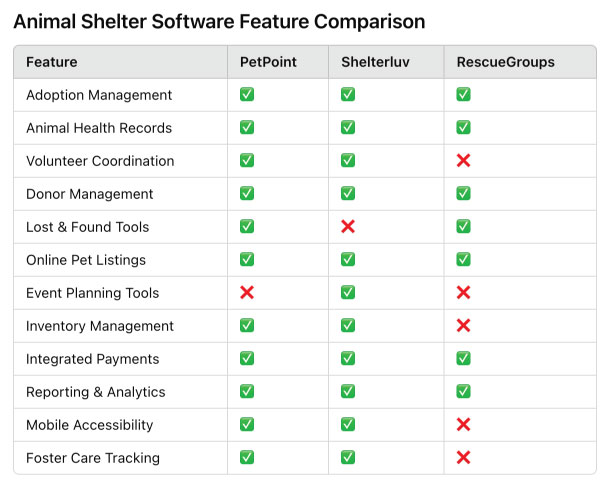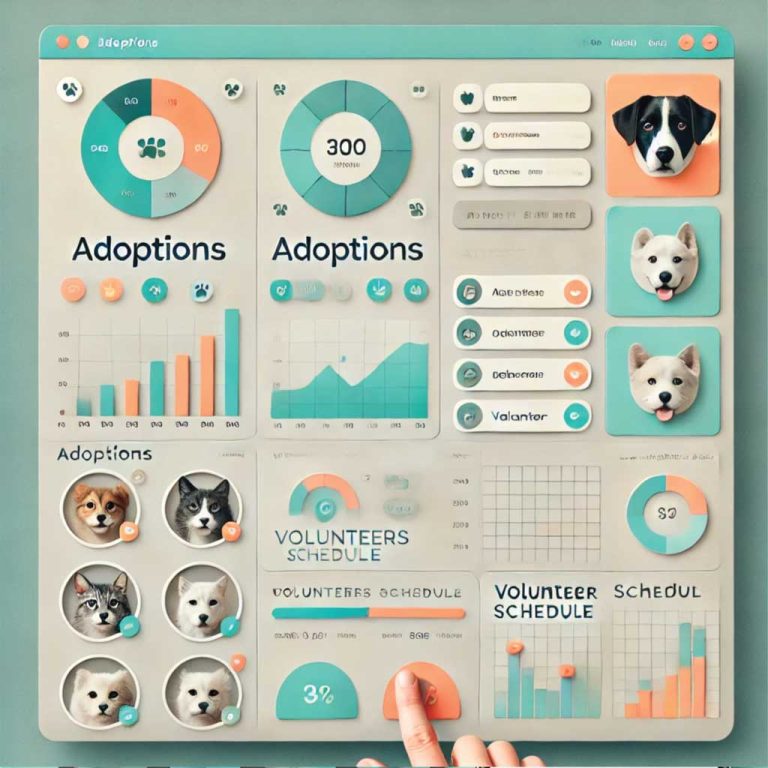Animal shelter software is designed to help shelters and rescue organizations manage their operations effectively, from tracking animals in their care to organizing adoptions and handling donations. These platforms integrate tools for animal care management, volunteer coordination, donor relationships, and more, allowing shelters to maximize their impact.
Examples of popular animal shelter software include PetPoint, Shelterluv, and RescueGroups, all offering user-friendly solutions tailored for different organization sizes. Related categories include Nonprofit Management Software, Veterinary Software, and Donor Management Software, as these share overlapping tools and functions critical to animal shelter operations.

Listed below are several examples of software products used in the Animal Shelter Software category.
The comparison table below highlights essential features of animal shelter software and how three leading products implement them. This will help you understand how different solutions address shelter needs.

The feature comparison table highlights the strengths and limitations of three popular animal shelter software products: PetPoint, Shelterluv, and RescueGroups. All three platforms offer essential features like adoption management, animal health records, and online pet listings, ensuring core shelter operations are supported.
However, differences emerge in specific functionalities. For instance, RescueGroups lacks volunteer coordination tools and foster care tracking, which may limit its usefulness for shelters with significant volunteer programs or foster networks. Conversely, Shelterluv excels with features like mobile accessibility and event planning tools, making it ideal for organizations focused on flexibility and community engagement.
PetPoint provides a well-rounded feature set, including inventory management and lost-and-found tools, making it a robust choice for shelters requiring comprehensive solutions. Overall, while most tools meet general operational needs, shelters should evaluate their unique priorities—such as volunteer management or event planning—to select the most suitable software.
This video provides a demo of Shelterluv, showcasing features commonly found in animal shelter software. From managing adoptions and tracking animal health records to organizing volunteer efforts and processing donations, this demo highlights how these tools help streamline shelter operations. If you’re exploring animal shelter software, this walkthrough offers a great example of the functionality and user experience you can expect from solutions in this category.
This image shows a simplified animal shelter software dashboard designed for easy navigation. Key sections include an Adoption Requests tracker, a gallery of Pet Profiles, and a Volunteer Schedule panel. The clean layout uses bright colors, minimal text, and intuitive icons to help users quickly access essential information without clutter. This example illustrates how software can keep shelter operations efficient and organized.

Animal shelter software offers a wide range of tools to simplify the day-to-day operations of shelters and rescue organizations. These platforms are built to ensure that animals receive the care they need while facilitating adoptions, tracking donors, and organizing volunteer efforts. Below, we’ll explore the key features that set animal shelter software apart and explain how they benefit shelters.
Animal shelter software helps organizations manage animal care, adoption processes, donations, and volunteer coordination to operate effectively.
Adoption management tracks applications, maintains pet profiles, and updates adoption statuses to ensure smooth processes.
Yes, most software can integrate with shelter websites to showcase adoptable pets and accept online applications.
Yes, many solutions, such as Animal Shelter Manager, cater to smaller shelters with limited budgets.
Many modern animal shelter platforms, like Shelterluv, offer mobile-friendly features for on-the-go accessibility.
Yes, most software supports integrations with payment processors (e.g., Stripe, PayPal) for donations and adoption fees, as well as CRMs for managing donor relationships.
Animal shelter software typically uses encryption, secure access controls, and compliance with data protection regulations (e.g., GDPR) to safeguard personal and financial data.
Many modern platforms are cloud-based, requiring only a device with internet access and a web browser, while others may offer on-premises installations with specific hardware requirements.
Some platforms, like Shelterluv or RescueGroups, offer API access, enabling shelters to build custom integrations with their websites or other tools.
Most solutions automatically back up data to secure servers on a regular basis, ensuring that shelter information is protected against loss or system failures.